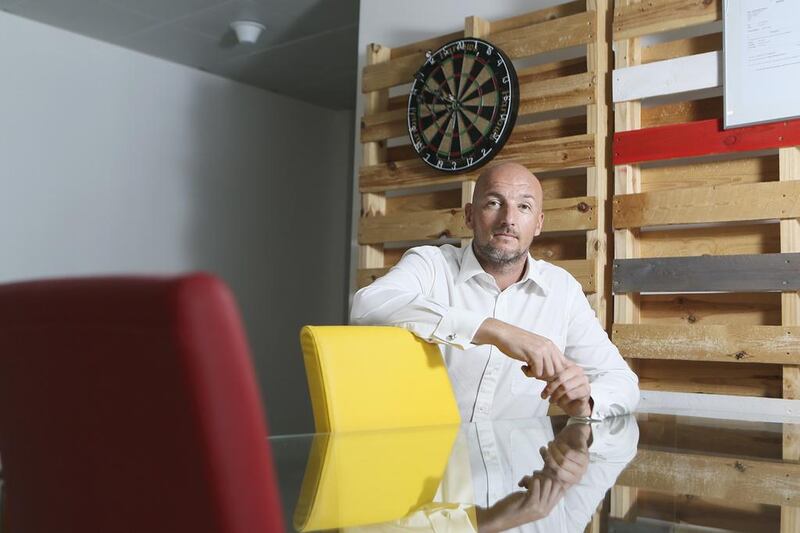Employee engagement is a ubiquitous term in today’s world of organisational development and leadership strategy. It generally refers to whether the workforce is committed to the organisation’s goals and values and motivated to contribute to its success, while also enhancing their own sense of well-being.
Oracle has released findings of its western European study on employee engagement, which reveals the people most likely to make employees feel engaged at work are their peers rather than their managers. The software company’s survey found 42 per cent of employees across Europe believe their peers have the most positive effect on how engaged they feel at work, well ahead of line managers (21 per cent) and business unit managers (7 per cent). Only 3 per cent of respondents feel HR has the biggest positive impact on their levels of engagement.
“It’s called work for a reason, you aren’t meant to enjoy it,” says Marcus Taylor, chief executive of the UAE recruiter Taylor Sterling, reminiscing about sage words of advice from his father. “But how things have changed, as losing a valued member of your team can have a substantial effect, not just on your business but the team dynamics.”
Having worked as a headhunter in Dubai for more than a decade, Mr Taylor has come across many reasons why people are considering their next move or are proving more difficult to lure away from their current positions. And he isn’t convinced the European survey’s results would stand up in the Emirates.
“I suspect if you conducted this survey in the UAE you would get a very different result,” he says. “The vast cultural differences are more prominent in this country and the UAE workforce is heavily weighted to the lower end of the pay scale, where needs often relate more to compensation, rather than a rewarding environment.”
However, Dr Tanja Upatel, a clinical psychologist at the German Neuroscience Center in Dubai, disagrees and feels the emotional factor completely supports the survey findings. “The fact peers have the most positive impact on how engaged someone feels at work is not surprising. Line managers, business unit managers and HR are all on one side – the employer’s. Peers are usually more detached from corporate goals, so it’s possible to open up and discuss issues without hesitation,” she says.
Dr Utapel also believes that when speaking to line managers or an HR department, employees will be guarded with words and careful not to open up. “As they are employees of the same company their role includes a conflict of interest. If one cannot openly address issues it will be difficult for the counterpart to give the right advice, to motivate or to engage.”
The ability to offload problems on peers is an important aspect of building workplace engagement, according to Dr Utapel. “Colleagues on a similar level can share problems and unload anger and frustration. While this wouldn’t be an appropriate behaviour with your line manager, it is perfectly fine with your work friends. We are all humans and need a balance between professional and private life. Peers, family and friends are an important resource to sustain productivity in stressful work situations.”
This is key if you consider another result from the Oracle survey that found employees in European businesses believe the senior leadership team (19 per cent) and line managers (11 per cent) are responsible for negatively affecting employee engagement.
Mr Taylor agrees. In his experience, he says, it is the managers who often cause employees to look for positions elsewhere.
“In the UAE, most become disenchanted with their job because of poor management, cultural differences and communication issues,” he adds. “However, over the last decade more companies have been making a quantifiable effort to go the extra mile to bring support and additional benefits to their workforce, whether it be inter-company leisure activities or team-building weekends away.”
One such company is Aimia, which has a workforce of 60 in its Dubai Internet City office. The global provider of loyalty programmes regularly invests in building employee engagement according to marketing manager Karen Cordeiro. “We have a staff committee organising monthly events outside of the office, such as bowling and quiz nights. We also have an annual sports event which runs all weekend, where we take over a sports centre and play football, cricket and basketball,” says Ms Cordeiro.
“It’s important employees get to know each other outside the work environment, and build a trusting, long-standing relationship and it’s reflected in a very low turnover of staff within our organisation. It bonds us as a unit and it means you have something to talk about in the office other than just work – it definitely makes us more engaged.”
But some companies have work to do if they want to address the gap between what makes employees engaged and the approach taken by management.
“This is a gap, which provides HR with a great opportunity to take ownership of engagement within their organisations.” says Loïc Le Guisquet, Oracle’s president for Emea and Asia Pacific. “Employees feel engaged by their peers and HR can help encourage this by providing access to sharing and collaboration platforms and social tools.”
business@thenational.ae
Follow The National's Business section on Twitter





